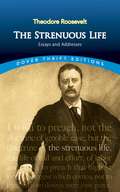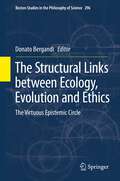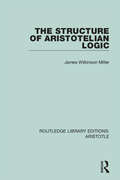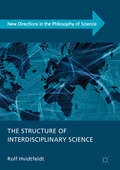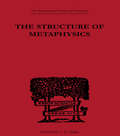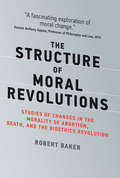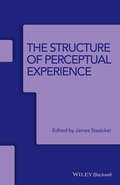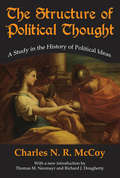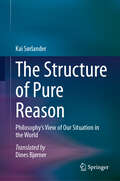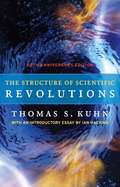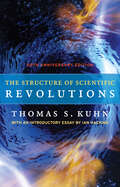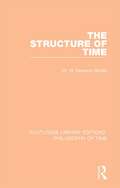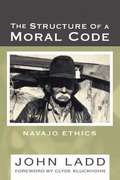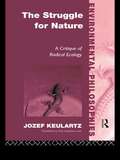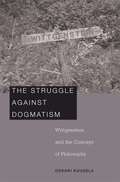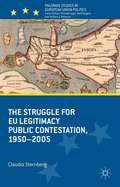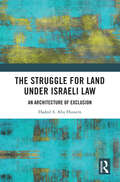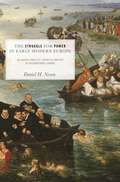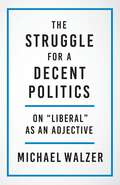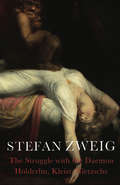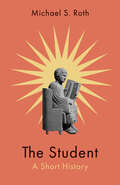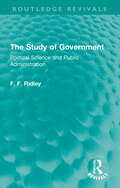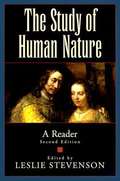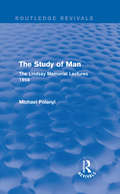- Table View
- List View
The Strenuous Life: Essays and Addresses (Dover Thrift Editions Ser.)
by Theodore RooseveltPolitician, soldier, naturalist, and historian--a century after the peak of his multifaceted career, Theodore Roosevelt remains a towering symbol of American optimism and progress. This collection of speeches and commentaries from 1899 through 1901 embodies the Rough Rider's enduring ideals for attaining a robust political, social, and personal life.The twenty-sixth president of the United States, Theodore Roosevelt (1858-1919) served as Chief Executive from 1901 to 1909 and was awarded the Nobel Prize in 1906 for his mediation of the Russo-Japanese War. Roosevelt wrote thirty-five books and delivered numerous lectures on topics ranging from citizenship and success to duty and sportsmanship. His 1899 address to a Chicago audience, "The Strenuous Life," articulates his belief in the transformative powers that individuals can achieve by overcoming hardship. Along with the other speeches and essays in this collection, Roosevelt's work offers an inspiring vision of moral rectitude and stalwart leadership.
The Structural Links between Ecology, Evolution and Ethics
by Donato BergandiEvolutionary biology, ecology and ethics: at first glance, three different objects of research, three different worldviews and three different scientific communities. In reality, there are both structural and historical links between these disciplines. First, some topics are obviously common across the board. Second, the emerging need for environmental policy management has gradually but radically changed the relationship between these disciplines. Over the last decades in particular, there has emerged a need for an interconnecting meta-paradigm that integrates more strictly evolutionary studies, biodiversity studies and the ethical frameworks that are most appropriate for allowing a lasting co-evolution between natural and social systems. Today such a need is more than a mere luxury, it is an epistemological and practical necessity.
The Structure of Aristotelian Logic (Routledge Library Editions: Aristotle #7)
by James Wilkinson MillerOriginally published in 1938. This compact treatise is a complete treatment of Aristotle’s logic as containing negative terms. It begins with defining Aristotelian logic as a subject-predicate logic confining itself to the four forms of categorical proposition known as the A, E, I and O forms. It assigns conventional meanings to these categorical forms such that subalternation holds. It continues to discuss the development of the logic since the time of its founder and address traditional logic as it existed in the twentieth century. The primary consideration of the book is the inclusion of negative terms - obversion, contraposition etc. – within traditional logic by addressing three questions, of systematization, the rules, and the interpretation.
The Structure of Empirical Knowledge
by Laurence BonJourHow must our knowledge be systematically organized in order to justify our beliefs? There are two options—the solid securing of the ancient foundationalist pyramid or the risky adventure of the new coherentist raft. For the foundationalist like Descartes each piece of knowledge can be stacked to build a pyramid. Not so, argues Laurence BonJour. What looks like a pyramid is in fact a dead end, a blind alley. Better by far to choose the raft. Here BonJour sets out the most extensive antifoundationalist argument yet developed. The first part of the book offers a systematic exposition of foundationalist views and formulates a general argument to show that no variety of foundationalism provides an acceptable account of empirical justification. In the second part he explores a coherence theory of empirical knowledge and argues that a defensible theory must incorporate an adequate conception of observation. The book concludes with an account of the correspondence theory of empirical truth and an argument that systems of empirical belief which satisfy the coherentist standard of justification are also likely to be true.
The Structure of Interdisciplinary Science (New Directions in the Philosophy of Science)
by Rolf HvidtfeldtThis book presents a novel approach to the analysis of interdisciplinary science based on the contemporary philosophical literature on scientific representation. The basic motivation for developing this approach is that epistemic issues are insufficiently dealt with in the existing literature on interdisciplinarity. This means that when interdisciplinary science is praised (as it often is), it is far from clear to what extent this praise is merited – at least if one cares about various more or less standardised measures of scientific quality. To develop a more adequate way of capturing what is going on in interdisciplinary science, the author draws inspiration from the rich philosophical literature on modelling, idealisation, perspectivism, and scientific pluralism. The discussion hereof reveals a number of critical pitfalls related to transferring mathematical and conceptual tools between scientific contexts, which should be relevant and interesting for anyone actively engaged in funding, evaluating, or carrying out interdisciplinary science.
The Structure of Metaphysics (International Library of Philosophy)
by Morris LazerowitzThis is Volume II of five in a series on Epistemology and Metaphysics. Originally published in 1955, this text has main areas: that change which has come over philosophy as we have come to realize how very strange philosophical questions are and presents a certain new view of philosophy and its associated new philosophical procedure; second, it presents typical philosophical disputes and illustrates the new procedure, asking what has led philosophers to say the extraordinary things they have said. At this stage the study aims to carry this inquiry only far enough to reveal some of the confusions, excuses and reasons behind philosophical doctrines. Finally, the inquiry is carried further and submits that there are often causes for adherence to a philosophical theory, deeper than those which appear when we ask the reasons for the theory. In illustration of this it ventures in outline a surmise as to one of the deeper sources which lie behind the old and phoenix-like paradox ‘Change is unreal’.
The Structure of Moral Revolutions: Studies of Changes in the Morality of Abortion, Death, and the Bioethics Revolution (Basic Bioethics)
by Robert BakerA theoretical account of moral revolutions, illustrated by historical cases that include the criminalization and decriminalization of abortion and the patient rebellion against medical paternalism.We live in an age of moral revolutions in which the once morally outrageous has become morally acceptable, and the formerly acceptable is now regarded as reprehensible. Attitudes toward same-sex love, for example, and the proper role of women, have undergone paradigm shifts over the last several decades. In this book, Robert Baker argues that these inversions are the product of moral revolutions that follow a pattern similar to that of the scientific revolutions analyzed by Thomas Kuhn in his influential book, The Structure of Scientific Revolutions. After laying out the theoretical terrain, Baker develops his argument with examples of moral reversals from the recent and distant past. He describes the revolution, led by the utilitarian philosopher Jeremy Bentham, that transformed the postmortem dissection of human bodies from punitive desecration to civic virtue; the criminalization of abortion in the nineteenth century and its decriminalization in the twentieth century; and the invention of a new bioethics paradigm in the 1970s and 1980s, supporting a patient-led rebellion against medical paternalism. Finally, Baker reflects on moral relativism, arguing that the acceptance of “absolute” moral truths denies us the diversity of moral perspectives that permit us to alter our morality in response to changing environments.
The Structure of Perceptual Experience (Ratio Special Issues)
by James StazickerThis innovative new collection features six original essays exploring the spatial, temporal, and other structures that shape conscious perception. Includes cutting-edge research on an increasingly influential topic in the philosophy of the mind Explores structural differences between the senses and between different theories of perceptual experience Offers innovative new arguments on the philosophy of perception written by leading scholars in the field
The Structure of Political Thought: A Study in the History of Political Ideas (The\library Of Conservative Thought Ser.)
by Charles McCoyOriginally published in 1963, this classic book is a rethinking of the history of Western political philosophy. Charles N. R. McCoy contrasts classical-medieval principles against the "hypotheses" at the root of modern liberalism and modern conservativism.In Part I, "The Classical Christian Tradition from Plato to Aquinas," the author lays the foundation for a philosophical "structure" capable of producing "constitutional liberty." Part II, "The Modern Theory of Politics from Machiavelli to Marx," attempts to show, beginning with Machiavelli, the reversal and destruction of the pre-modern "structure" postulated in Part I.McCoy stresses the great contributions of Aristotle to political thought found in his more familiar Ethics and Politics, but also includes key insights drawn from Metaphysics and Physics. These contributions are developed and perfected, McCoy argues, by Augustine and Aquinas. Two other important features include McCoy's epistemological insights into Plato's work that will be new to many readers and the author's juxtaposition of traditional natural law with "the modernized theory of natural law." The modern account of autonomous natural law, in McCoy's view, helps explain the totalitarian direction of key aspects of modern political thought. This classic volume on the origins of modern philosophical thought remains a standard in the field.
The Structure of Pure Reason: Philosophy’s View of Our Situation in the World
by Kai SørlanderThis book explains how the idea of there being no ultimate, universal truth is in itself a contradictory philosophical position. Philosophers throughout history have tried to answer the question of what the deepest truth is about the world and our situation in it. They have put forward various philosophical systems, but none have won universal acceptance; and it is widely believed today that the time of philosophical systems is over. This book shows very concretely how to proceed in order to uncover the system of mutually defined basic concepts, which must be presupposed for any possible description of reality and any possible description of our situation as persons. Thus, in reigniting the discussion on philosophical systems, the author adds to the historical and contemporary discussions of Kant’s structure of pure reason.
The Structure of Scientific Revolutions
by Thomas S. KuhnA good book may have the power to change the way we see the world, but a great book actually becomes part of our daily consciousness, pervading our thinking to the point that we take it for granted, and we forget how provocative and challenging its ideas once were—and still are. The Structure of Scientific Revolutions is that kind of book. When it was first published in 1962, it was a landmark event in the history and philosophy of science. Fifty years later, it still has many lessons to teach.<P><P> With The Structure of Scientific Revolutions, Kuhn challenged long-standing linear notions of scientific progress, arguing that transformative ideas don’t arise from the day-to-day, gradual process of experimentation and data accumulation but that the revolutions in science, those breakthrough moments that disrupt accepted thinking and offer unanticipated ideas, occur outside of “normal science,” as he called it. Though Kuhn was writing when physics ruled the sciences, his ideas on how scientific revolutions bring order to the anomalies that amass over time in research experiments are still instructive in our biotech age.<P> Chosen for Mark Zuckerberg's "A Year of Books"
The Structure of Scientific Revolutions: 50th Anniversary Edition
by Thomas S. KuhnA good book may have the power to change the way we see the world, but a great book actually becomes part of our daily consciousness, pervading our thinking to the point that we take it for granted, and we forget how provocative and challenging its ideas once were—and still are. The Structure of Scientific Revolutions is that kind of book. When it was first published in 1962, it was a landmark event in the history and philosophy of science. Fifty years later, it still has many lessons to teach. With The Structure of Scientific Revolutions, Kuhn challenged long-standing linear notions of scientific progress, arguing that transformative ideas don’t arise from the day-to-day, gradual process of experimentation and data accumulation but that the revolutions in science, those breakthrough moments that disrupt accepted thinking and offer unanticipated ideas, occur outside of “normal science,” as he called it. Though Kuhn was writing when physics ruled the sciences, his ideas on how scientific revolutions bring order to the anomalies that amass over time in research experiments are still instructive in our biotech age. This new edition of Kuhn’s essential work in the history of science includes an insightful introduction by Ian Hacking, which clarifies terms popularized by Kuhn, including paradigm and incommensurability, and applies Kuhn’s ideas to the science of today. Usefully keyed to the separate sections of the book, Hacking’s introduction provides important background information as well as a contemporary context. Newly designed, with an expanded index, this edition will be eagerly welcomed by the next generation of readers seeking to understand the history of our perspectives on science.
The Structure of Time (Routledge Library Editions: Philosophy of Time)
by W. H. Newton-SmithOriginally published in 1980. What is time? How is its structure determined? The enduring controversy about the nature and structure of time has traditionally been a diametrical argument between those who see time as a container into which events are placed, and those for whom time cannot exist without events. This controversy between the absolutist and the relativist theories of time is a central theme of this study. The author's impressive arguments provide grounds for rejecting both these theories, firstly by establishing that ‘empty’ time is possible, and secondly by showing, through a discussion of the structure of time which involves considering whether time might be cyclical, branching, beginning or non-beginning, that the absolutist theory of time is untenable. This book then advances two new theories, and succeeds in shifting the traditional debate about time to a consideration of time as a theoretical structure and as a theoretical framework.
The Structure of a Moral Code: Navajo Ethics
by John LaddIn this book, the author presents a philosophical analysis of the nature and structure of a moral code. Mr. Ladd shows how the codes of other societies can be described with scientific rigor and objectivity. He develops a general theory of moral codes which holds considerable significance for moral philosophers and which presents for anthropologists a methodology for their investigations into the ethical systems of non-literate cultures.
The Struggle For Nature: A Critique of Environmental Philosophy (Environmental Philosophies)
by Jozet KeulartzThe Struggle for Nature outlines and examines the main aspects of current environmental philosophy including deep ecology, social and political ecology, eco-feminism and eco-anarchism. It criticises the dependency on science of these philosophies and the social problems engendered by them. The author argues for a post-naturalistic turn in environmental philosophy. The Struggle for Nature presents the most up-to-date arguments in environmental philosophy, which will be valuable reading for students of applied philosophy, environmental studies and geography.
The Struggle against Dogmatism: Wittgenstein and the Concept of Philosophy
by Oskari KuuselaSearching for rigor and a clear grasp of the essential features of their objects of investigation, philosophers are often driven to exaggerations and harmful simplifications. According to Ludwig Wittgenstein’s provocative suggestion, this has to do with confusions relating to the status of philosophical statements. The Struggle against Dogmatism elucidates his view that there are no theses, doctrines, or theories in philosophy. Even when this claim is taken seriously, explanations of what it means are problematic—typically involving a relapse to theses. This book makes Wittgenstein’s philosophical approach comprehensible by presenting it as a response to specific problems relating to the practice of philosophy, in particular the problem of dogmatism.Although the focus of this book is on Wittgenstein’s later work, Oskari Kuusela also discusses Wittgenstein’s early philosophy as expressed in the Tractatus, as well as the relation between his early and later work. In the light of this account of Wittgenstein’s critique of his early thought, Kuusela is able to render concrete what Wittgenstein means by philosophizing without theses or theories. In his later philosophy, Kuusela argues, Wittgenstein establishes a non-metaphysical (though not anti-metaphysical) approach to philosophy without philosophical hierarchies. This method leads to an increase in the flexibility of philosophical thought without a loss in rigor.
The Struggle for EU Legitimacy
by Claudia Schrag SternbergThis award-winning book answers some of the big questions on the legitimacy of the European Union. Specifically, it looks at what it would mean for the EU to be considered a legitimate body and where our ideas on this question come from. The Struggle for EU Legitimacy traces the history of constructions and contestations of the EU's legitimacy, in discourses of the European institutions and in public debate. Through an interpretive, non-quantitative textual analysis of an eclectic range of sources, it examines both long-term patterns in EU-official discourses and their reception in member-state public spheres, specifically in the German and French debates on the Maastricht and Constitutional Draft Treaties. The story told portrays the history of legitimating the EU as a continuous contest over the ends and goals of integration, as well as a balancing act--which was inescapable given the nature of the integration project--between 'bringing the people in' and 'keeping them out'. In addition, it was a balancing act between actively politicizing and deliberately de-politicizing the stakes of EU politics.
The Struggle for Land Under Israeli Law: An Architecture of Exclusion
by Hadeel S. Abu HusseinThis book provides a comprehensive examination of land law for Arab Palestinians under Israeli law. Land is one of the core resources of human existence, development and activity. Therefore, it is also a key basis of political power and of social and economic status. Land regimes and planning regulations play a dynamic role in deciding how competing claims over resources will be resolved. According to legal geography, spatial ordering impacts legal regimes; whilst legal rules form social and human space. Through the lenses of international law, colonisation and legal geography, the book examines the land regime in Israel. More specifically, it endeavours to understand the spatial strategies adopted by Israel to organise the entire territorial expanse of the country as Jewish, while also excluding Arab Palestinian citizens of Israel and residents of East Jerusalem from the landscape. The book then details how the systematic nature and processes of marginalisation are mapped out across the civil, political and socio-economic landscape. This monograph will be of interest to international legal theorists, legal geographers, land lawyers and human rights practitioners and students; as well as to international scholars, NGOs and others focusing on the Israeli–Palestinian conflict.
The Struggle for Power in Early Modern Europe: Religious Conflict, Dynastic Empires, and International Change (Princeton Studies in International History and Politics #116)
by Daniel H. NexonScholars have long argued over whether the 1648 Peace of Westphalia, which ended more than a century of religious conflict arising from the Protestant Reformations, inaugurated the modern sovereign-state system. But they largely ignore a more fundamental question: why did the emergence of new forms of religious heterodoxy during the Reformations spark such violent upheaval and nearly topple the old political order? In this book, Daniel Nexon demonstrates that the answer lies in understanding how the mobilization of transnational religious movements intersects with--and can destabilize--imperial forms of rule. Taking a fresh look at the pivotal events of the sixteenth and seventeenth centuries--including the Schmalkaldic War, the Dutch Revolt, and the Thirty Years' War--Nexon argues that early modern "composite" political communities had more in common with empires than with modern states, and introduces a theory of imperial dynamics that explains how religious movements altered Europe's balance of power. He shows how the Reformations gave rise to crosscutting religious networks that undermined the ability of early modern European rulers to divide and contain local resistance to their authority. In doing so, the Reformations produced a series of crises in the European order and crippled the Habsburg bid for hegemony. Nexon's account of these processes provides a theoretical and analytic framework that not only challenges the way international relations scholars think about state formation and international change, but enables us to better understand global politics today.
The Struggle for a Decent Politics: On "Liberal" as an Adjective
by Michael WalzerA testament to what it means to be liberal by one of the most prominent political philosophers of our era There was a time when liberalism was an ism like any other, but that time, writes Michael Walzer, is gone. “Liberal” now conveys not a specific ideology but a moral stance, so the word is best conceived not as a noun but as an adjective—one is a “liberal democrat” or a “liberal nationalist.” Walzer itemizes the characteristics described by “liberal” in an inventory of his own deepest political and moral commitments—among other things, to the principle of equality, to the rule of law, and to a pluralism that is both political and cultural. Unabashedly asserting that liberalism comprises a universal set of values (“they must be universal,” he writes, “since they are under assault around the world”), Walzer reminds us in this inspiring book why those values are worth fighting for.
The Struggle with the Daemon
by Eden Paul Cedar Paul Stefan ZweigThe Struggle with the Daemon is a brilliant analysis of the European psyche by the great novelist and biographer Stefan Zweig. Zweig studies three giants of German literature and thought: Friedrich Ho¨lderlin, Heinrich von Kleist and Friedrich Nietzsche - powerful minds whose ideas were at odds with the scientific positivism of their age; troubled spirits whose intoxicating passions drove them mad but inspired them to great works. In their struggle with their inner creative force, Zweig reflects the conflict at the heart of the European soul - between science and art, reason and inspiration.Both highly personal and philosophically wide-ranging, this is one of the most fascinating of Zweig's renowned biographical studies.From the Trade Paperback edition.
The Student: A Short History
by Michael S. RothFrom the president of Wesleyan University, an illuminating history of the student, spanning from antiquity to Zoom In this sweeping book, Michael S. Roth narrates a vivid and dynamic history of students, exploring some of the principal models for learning that have developed in very different contexts, from the sixth century BCE to the present. Beginning with the followers of Confucius, Socrates, and Jesus and moving to medieval apprentices, students at Enlightenment centers of learning, and learners enrolled in twenty-first-century universities, he explores how students have been followers, interlocutors, disciples, rebels, and children becoming adults. There are many ways to be a student, Roth argues, but at their core is developing the capacity to think for oneself by learning from others, and thereby finding freedom. In an age of machine learning, this book celebrates the student who develops more than mastery, cultivating curiosity, judgment, creativity, and an ability to keep learning beyond formal schooling. Roth shows how the student throughout history has been someone who interacts dynamically with the world, absorbing its lessons and creatively responding to them.
The Study of Government: Political Science and Public Administration (Routledge Revivals)
by F. F. RidleyOriginally published in 1975, this book advocates a certain approach to the study of government: the focus should be institutional, the method comparative and the level practical. The book divides into 2 sections on political science and public administration but the themes are common, as is much of the subject matter. Chapters on the institutional and comparative approach are intended to show how political institutions are often designed to reflect political theories, how institutional engineering may take place and how lessons for domestic reform may be learnt from foreign experience. The second section looks at the state of public administration studies in Britain, the nature of the subject, drawing on the work of earlier theorists, the role of the universities and the civic contribution such study can make
The Study of Human Nature: A Reader (Second Edition)
by Leslie StevensonThis anthology provides an introduction to a variety of views about human nature, from various cultures over three millennia. It ranges from ancient religious texts down to contemporary theories based on evolutionary science. It can be used as a reader to go along with Ten Theories of Human Nature 4e, but it can also be used independently.
The Study of Man: The Lindsay Memorial Lectures 1958 (Routledge Revivals)
by Michael PolanyiMichael Polanyi (1891-1976) was an eminent theorist across the fields of philosophy, physical chemistry and economics. Elected to the Royal Society and the American Academy of Arts and Sciences, his contributions to research in the social sciences, and his theories on positivism and knowledge, are of critical academic importance. The three lectures included in this comprehensive volume, first published in 1959, argue for Polanyi’s principle of ‘tacit knowing’ as a fundamental component of knowledge. They were intended to accompany Polanyi’s earlier work, Personal Knowledge, and as a tribute to the philosophical and educational work of Lord A. D. Lindsay.
